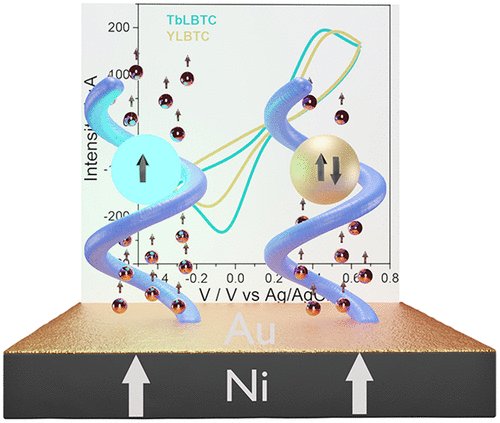当前位置:
X-MOL 学术
›
J. Am. Chem. Soc.
›
论文详情
Our official English website, www.x-mol.net, welcomes your
feedback! (Note: you will need to create a separate account there.)
Reinforced room temperature spin filtering in chiral paramagnetic metallopeptides
Journal of the American Chemical Society ( IF 14.4 ) Pub Date : 2020-09-17 , DOI: 10.1021/jacs.0c07531 Ramón Torres-Cavanillas 1 , Garin Escorcia-Ariza 1 , Isaac Brotons-Alcázar 1 , Roger Sanchis-Gual 1 , Prakash Chandra Mondal 1 , Lorena E Rosaleny 1 , Silvia Giménez-Santamarina 1 , Michele Sessolo 1 , Marta Galbiati 1 , Sergio Tatay 1 , Alejandro Gaita-Ariño 1 , Alicia Forment-Aliaga 1 , Salvador Cardona-Serra 1
Journal of the American Chemical Society ( IF 14.4 ) Pub Date : 2020-09-17 , DOI: 10.1021/jacs.0c07531 Ramón Torres-Cavanillas 1 , Garin Escorcia-Ariza 1 , Isaac Brotons-Alcázar 1 , Roger Sanchis-Gual 1 , Prakash Chandra Mondal 1 , Lorena E Rosaleny 1 , Silvia Giménez-Santamarina 1 , Michele Sessolo 1 , Marta Galbiati 1 , Sergio Tatay 1 , Alejandro Gaita-Ariño 1 , Alicia Forment-Aliaga 1 , Salvador Cardona-Serra 1
Affiliation

|
Chirality-induced spin selectivity (CISS), whereby helical molecules polarize the spin of electrical current, is an intriguing effect with potential applications in nanospintronics. In this nascent field, the study of the CISS effect using paramagnetic chiral molecules, which could introduce another degree of freedom in controlling the spin transport, remains so far unexplored. To address this challenge, herein, we propose the use of self-assembled monolayers (SAMs) of helical lanthanide-binding peptides. In order to elucidate the effect of the paramagnetic nuclei, monolayers of the peptide coordinating paramagnetic or diamagnetic ions are prepared. By means of spin-dependent electrochemistry, CISS effect is demonstrated by cyclic voltammetry and electrochemical impedance measurements for both samples. Additionally, an implementation of the standard liquid-metal drop electron transport setup has been carried out, demonstrating their suitability for solid-state devices. Remarkably, the inclusion of a paramagnetic center in the peptide increases the spin polarization as independently proved by different techniques. These findings permit the inclusion of magnetic biomolecules in the CISS field, paving the way to their implementation in a new generation of (bio)spintronic nanodevices.
中文翻译:

手性顺磁性金属肽中增强的室温自旋过滤
手性诱导的自旋选择性 (CISS),即螺旋分子极化电流的自旋,是一种在纳米自旋电子学中具有潜在应用的有趣效应。在这个新兴领域,使用顺磁手性分子研究 CISS 效应,这可以在控制自旋输运方面引入另一个自由度,但迄今为止仍未探索。为了应对这一挑战,在本文中,我们建议使用螺旋镧系元素结合肽的自组装单层 (SAM)。为了阐明顺磁核的作用,制备了肽配位顺磁或反磁离子的单层。通过与自旋相关的电化学,两种样品的循环伏安法和电化学阻抗测量证明了 CISS 效应。此外,已经实施了标准液态金属液滴电子传输设置,证明它们适用于固态设备。值得注意的是,在肽中包含顺磁中心会增加自旋极化,这是由不同技术独立证明的。这些发现允许将磁性生物分子纳入 CISS 领域,为它们在新一代(生物)自旋电子纳米器件中的实施铺平了道路。
更新日期:2020-09-17
中文翻译:

手性顺磁性金属肽中增强的室温自旋过滤
手性诱导的自旋选择性 (CISS),即螺旋分子极化电流的自旋,是一种在纳米自旋电子学中具有潜在应用的有趣效应。在这个新兴领域,使用顺磁手性分子研究 CISS 效应,这可以在控制自旋输运方面引入另一个自由度,但迄今为止仍未探索。为了应对这一挑战,在本文中,我们建议使用螺旋镧系元素结合肽的自组装单层 (SAM)。为了阐明顺磁核的作用,制备了肽配位顺磁或反磁离子的单层。通过与自旋相关的电化学,两种样品的循环伏安法和电化学阻抗测量证明了 CISS 效应。此外,已经实施了标准液态金属液滴电子传输设置,证明它们适用于固态设备。值得注意的是,在肽中包含顺磁中心会增加自旋极化,这是由不同技术独立证明的。这些发现允许将磁性生物分子纳入 CISS 领域,为它们在新一代(生物)自旋电子纳米器件中的实施铺平了道路。






























 京公网安备 11010802027423号
京公网安备 11010802027423号